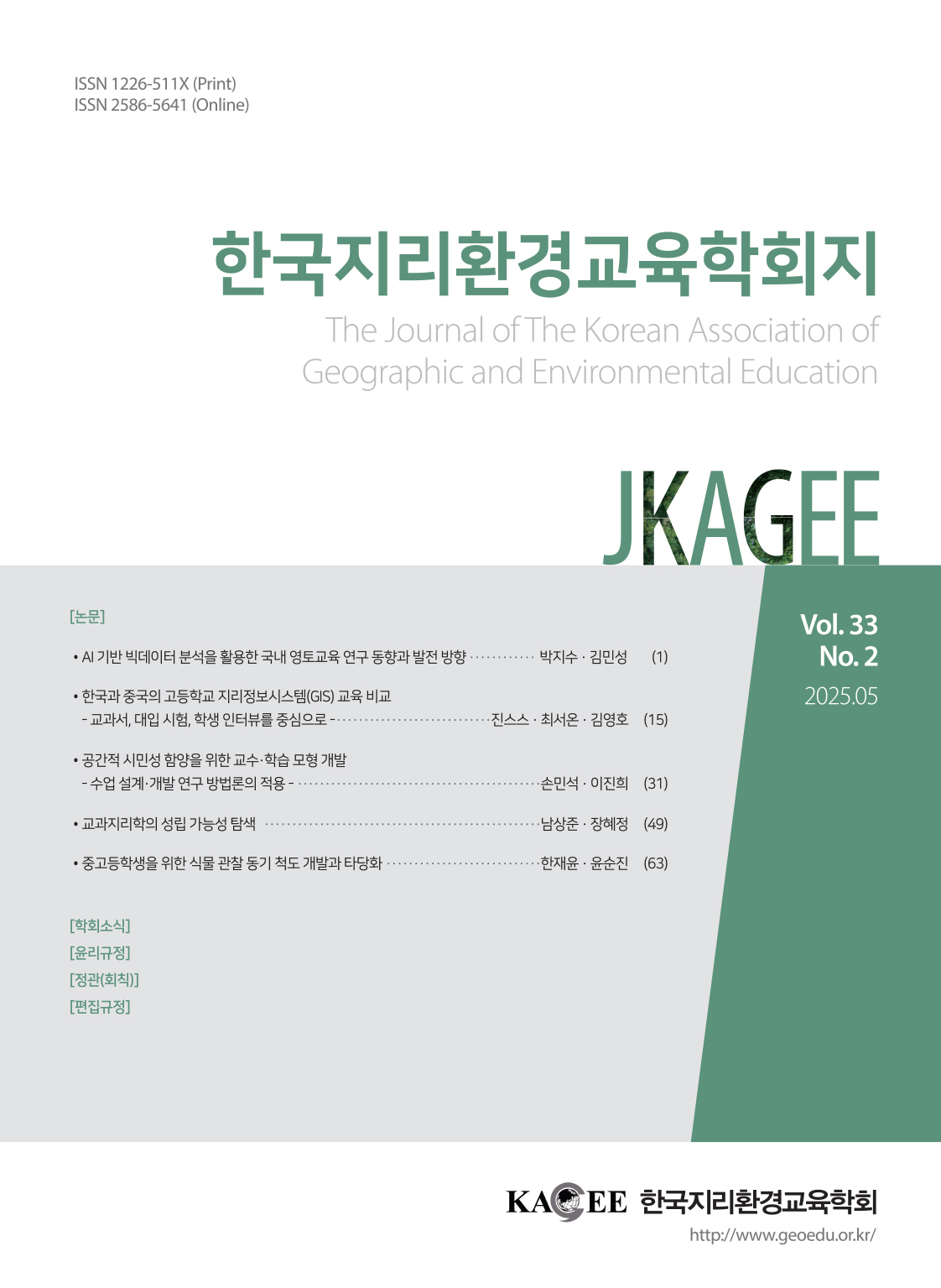Research Article
Abstract
References
Information
This study aims to reveal the relationship between affective outcome and self-directed learning ability based on the results of responses to geographic affective outcome and self-directed learning readiness. To this end, a survey and statistical analysis were conducted on 782 students attending high schools located in Gyeonggi-do, and the results are as follows. First, it was found that there was a positive correlation between the geographic affective outcome sub-factors and self-directed learning readiness. Second, as a result of cluster analysis of the affective outcome of the geography subject, it was categorized into four clusters: ‘low affective outcome type’, ‘individual priority type’, ‘community priority type’, and ‘high affective outcome type’. Third, when looking at self-directed learning readiness according to geographic affective outcome types, the high affective outcome type shows the highest self-directed learning readiness among all types, while the low affective outcome type shows the lowest self-directed learning readiness among all types. However, the individual priority type and the community priority type are higher than the low affective outcome type and lower than the high affective outcome type, but no significant difference between the two has been confirmed.
본 연구는 지리교과 정의적 성과와 자기 주도적 학습 준비도에 대한 응답 결과를 바탕으로 정의적 성과와 자기주도 학습능력과의 관계를 밝히는 것이다. 이를 위해 경기도 소재 고등학교에 재학 중인 학생 782명에게 설문조사를 실시하고 통계적 분석을 실시하였으며 그 결과는 다음과 같다. 첫째, 지리교과의 정의적 성과 하위요인과 자기 주도적 학습 준비도는 정적 상관관계가 있는 것으로 나타났다. 둘째, 지리교과의 정의적 성과를 군집분석한 결과 ‘낮은 정의적 성과형’, ‘개인 우선형’, ‘공동체 우선형’, ‘높은 정의적 성과형’의 4개 군집으로 유형화되었다. 셋째, 지리교과 정의적 성과 유형에 따른 자기주도 학습 준비도를 보면, 높은 정의적 성과형은 모든 유형 중 가장 높은 자기주도 학습 준비도를 보여주고 있고, 낮은 정의적 성과형은 모든 유형 중 가장 낮은 자기주도 학습 준비도를 보여주고 있다. 다만, 개인 우선형과 공동체 우선형은 낮은 정의적 성과형보다는 높고, 높은 정의적 성과형보다는 낮은 값을 나타내지만, 둘 간의 유의미한 차이는 확인되지 않았다.
- 강승호·김명숙·김정환·남현우·허숙, 2008, 현대 교육평가의 이론과 실제, 양서원.
- 곽수란·이기종, 2009, “학생의 자기조절학습능력, 교사의 수업활동 그리고 학업성취와의 관계 분석”, 교육논총, 29(1), 35-60.
- 교육부, 2022, 초·중등학교 교육과정 총론, 교육부 고시 제2022-33호 [별책1].
- 구정화, 2012, “초등학생의 NIE 학습유형과 자기주도적 학습능력의 관련성”, 사회과교육, 51(4), 93-108.
- 김성훈·이안수, 2008, “초등학교 체육수업에서 자기 주도적 학습이 정의적 영역에 미치는 영향”, 한국스포츠교육학회지, 15(2), 151-170.
- 김은정, 2013, 개념도(Concept Map)그리기 활동이 자기 주도적 학습 능력과 학업 성취도에 미치는 효과 -초등 6학년 지리 영역을 중심으로-, 경인교육대학교 교육대학원 석사학위논문.
- 김재남, 2002, “John K. Wright(1891~1969)의 지리적 상상력과 미학적 지관념론”, 지리교육논집, 46, 65-83.
- 김주후·남궁지영, 2008, “중학교 학생들의 자기주도적 학습 능력 분석”, 한국심리학회지, 14(1), 153-166.
- 김지연·김기홍, 2023, “비대면 수업과 대면 수업에서 자기주도학습능력이 인지된 성취도에 미치는 영향”, 학습자중심교과교육연구, 23(14), 351-362. 10.22251/jlcci.2023.23.14.351
- 김효희, 2007, 지리과에서 신문포트폴리오를 통한 자기주도학습의 효과성 -고등학교 환경과 자연재해 단원을 중심으로-, 고려대학교 교육대학원 석사학위논문.
- 류정림·곽윤복·김신희, 2022, “간호대학생의 성장 마인드셋이 인지된 학업성취도에 미치는 영향: 자기주도학습능력의 매개효과”, 학습자중심교과교육연구, 22(20), 469-477. 10.22251/jlcci.2022.22.20.469
- 성정원, 2020, 지리교과의 정의적 성과 측정 도구 개발 연구, 아주대학교 박사학위논문.
- 성정원·김주후, 2016, “지리교과 정의적 특성 선정을 위한 델파이 연구”, 교육과정 평가 연구, 19(3), 23-40. 10.29221/jce.2016.19.3.23
- 성태제, 2015, 알기쉬운 통계분석, 학지사.
- 연보라·장희원·김경근, 2013, “부모의 사회경제적 지위, 학업지원, 양육방식, 사교육 참여, 자기주도적 학습능력 간의 구조적 관계”, 한국교육학연구, 19(3), 99-122.
- 이재신, 2009, “고등학생의 메타인지와 학습몰입과의 관계: 자기주도적 학습능력의 매개효과”, 한국교원교육연구, 26(2), 277-295.
- 유귀옥, 1997, 성인학습자의 자기 주도성과 인구학적 및 사회 심리학적 변인 연구, 서울대학교 박사학위논문.
- 정인숙, 2021, “간호학과 신입생의 자기주도학습역량에 영향을 미치는 요인”, 학습자중심교과교육연구, 21(6), 737-749. 10.22143/HSS21.11.5.54
- 조일현, 2004, 자기주도적 지리수업을 통한 학습 효과 연구: 통일의식 및 학업성취도를 중심으로, 건국대학교 교육대학원 석사학위논문.
- 주동범·전은순, 2011, “성인학습자의 평생학습 참여경험 및 자기주도 학습이 자기효능감에 미치는 영향”, 직업교육연구, 30(1), 15-28.
- 주호수, 2003, “자기 주도적 학습의 개념화와 교육적 시사점”, 교육과정연구, 21(1), 203-221.
- 진영은·이진욱, 2007, “자기주도적 학습에 관한 국내연구 동향 및 과제”, 한국교육연구, 24(1), 221-249.
- 최경민·김민지, 2019, “대학의 비교과 학습공동체 활동이 자기주도적 학습능력에 미치는 영향 -이러닝을 활용한 학습공동체를 중심으로-”, 학습자중심교과교육연구, 19(1), 1283-1300.
- 최진·이진호, 2023, “‘에이전시’(Agency)와 ‘학생 주도성’(Student Agency) 사이: 학생 주도성 담론의 존재론적 전회에 관하여”, 교육학연구, 61(5), 33-62. 10.30916/KERA.61.5.33
- 한현진·김찬우, 2013, “군집분석 기법을 이용하 군 급식 개선방안 연구”, 한국국방경영분석학회지, 39(1), 39-48.
- 황우원·김주후, 2019, “중학교 진로진학상담교사의 직무수행유형과 학교 진로교육 목표 달성 간의 관계”, 진로교육연구, 32(2), 139-160. 10.32341/JCER.2019.06.32.2.139
- Anderson, L. W., 1981,
Assessing affective characteristics in the schools , Boston: Allyn and Bacon, Inc. - Bloom, B. S., 1976,
Human characteristics and school learning , New york: Mcgraw-Hill. - Chukwunemerem, O. P., 2023, Lessons from Self-Directed Learning Activities and Helping University Students Think Critically,
Journal of Education and Learning , 12(2), 79-87. 10.5539/jel.v12n2p79 - Knowles, M., 1975,
Self-direction learning: A guide for learners and teacher . New York: Association Press. - Tyler, R. W., 1973, Assessing Educational Achievement in the Affective Domain,
Measurement in Education , 4(3), 1-8. - West, R. R. and Bentley, E. L. Jr., 1990, Structure analysis of the self-directed learning readiness scale: A confirmatory factor analysis using LISREL modeling, in Long, H. B., and Associates,
Advances in Research and Practice in Self-Directed Learning , Norman: Oklahoma Research Center for Continuing Professional and Higher Education of the University of Oklahoma.
- Publisher :The Korean Association Of Geographic And Environmental Education
- Publisher(Ko) :한국지리환경교육학회
- Journal Title :The Journal of The Korean Association of Geographic and Environmental Education
- Journal Title(Ko) :한국지리환경교육학회지
- Volume : 32
- No :1
- Pages :133~146
- DOI :https://doi.org/10.17279/jkagee.2024.32.1.133



 The Journal of The Korean Association of Geographic and Environmental Education
The Journal of The Korean Association of Geographic and Environmental Education







